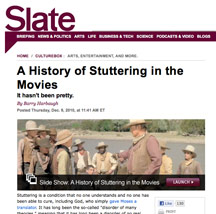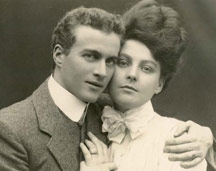
Slate Magazine has an excellent article on the history of stuttering in movies. It features some older, little-known films as well as the popular ones of today. Hollywood definitely does a disservice to stutterers, with few exceptions. It is usually portrayed as a sign of weakness or ineptitude. One sad but funny example is a Western where John Wayne's character is able to bully the stuttering out of a young fellow – "Get rid of that stutter or go home, pardner!" The boy becomes angry and his stuttering is cured.
While it is true sometimes people who stutter can shout or swear fluently when they are made angry, keeping them in a constant state of anger is not a treatment for stuttering! Anger is stressful and causes worse stuttering.
Hollywood may have redeemed itself with its current offering, The King's Speech. A lot has been said about how excellent this movie is, finally giving a realistic depiction of what stuttering is and how it is experienced. What many people have been wondering is why on earth did it take so long to make this movie? The events portrayed happened almost seventy years ago! There is an article in an Australian paper about Lionel Logue, the speech therapist that came to King George VI's aid, that answers that question.

Over thirty years ago a Hollywood screenwriter, David Seidler, approached Logue's middle son asking for access to his father's papers and inviting him to participate in a movie based on the events. However the Queen Mother strictly forbade the Logues from doing so, writing them a personal letter telling them that such a thing would be a painful reminder of a difficult time in her life. She was in her 80s by then, but if the screenwriter decided to wait until her death, he still had another twenty years to go. The feisty old dame lived until 101!
On one hand, it might have been for the best, as it is unlikely it would have been as high a quality as the film we are seeing today in 2010. Yet it is still regretful that she was so adamant that her husband's story of his stuttering not be shared earlier, because so many people could have benefited from the telling.